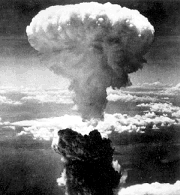1950 – 1959 World History
- 1950
- Brink's robbery in Boston; almost $3 million stolen (Jan. 17). Truman orders development of hydrogen bomb (Jan. 31). Robert Schuman proposes Schuman Plan to pool European coal and steel (May 9). Korean War begins when North Korean Communist forces invade South Korea (June 25). (For detailed chronology, seeKorean War.) Assassination attempt on President Truman by Puerto Rican nationalists (Nov. 1). McCarthyism begins.
- 1951
- Julius and Ethel Rosenberg sentenced to death for passing atomic secrets to Russians (March). Spurred by Schuman Plan, six nations form European Coal and Steel Community (April); effective 1952. Japanese peace treaty signed in San Francisco by 49 nations (Sept. 8). Color television introduced in U.S. Libya gains independence (Dec. 24).
- 1952
- George VI dies; his daughter becomes Elizabeth II (Feb. 6). AEC announces “satisfactory” experiments in hydrogen-weapons research; eyewitnesses tell of blasts near Enewetak (Nov.). Ralph Ellison's The Invisible Man.
- 1953
- Gen. Dwight D. Eisenhower inaugurated president of United States (Jan. 20). Stalin dies (March 5). Malenkov becomes Soviet premier; Beria, minister of interior; Molotov, foreign minister (March 6). Dag Hammarskjöld begins term as UN secretary-general (April 10). James Watson and Francis Crick publish their discovery of the molecular model of DNA (April–May). Edmund Hillary of New Zealand and Tenzing Norgay of Nepal reach top of Mt. Everest (May 29). East Berliners rise against Communist rule; quelled by tanks (June 17). Egypt becomes republic ruled by military junta (June 18). Julius and Ethel Rosenberg executed in Sing Sing prison (June 19). Korean armistice signed (July 27). Moscow announces explosion of hydrogen bomb (Aug. 20). Tito becomes president of Yugoslavia. James Watson, Francis Crick, and Rosalind Franklin discover structure of DNA. Ernest Hemingway wins Pulitzer for The Old Man and the Sea.
- 1954
- First atomic submarine Nautilus launched (Jan. 21). Five U.S. congressmen shot on floor of House as Puerto Rican nationalists fire from spectators' gallery; all five recover (March 1). Soviet Union grants sovereignty to East Germany (March 23). Army v. McCarthy inquiry—Senate subcommittee report blames both sides (April 22–June 17). Dien Bien Phu, French military outpost in Vietnam, falls to Vietminh army (May 7). (For detailed chronology, see Vietnam War.) U.S. Supreme Court (in Brown v. Board of Education of Topeka) unanimously bans racial segregation in public schools (May 17). Eisenhower launches world atomic pool without Soviet Union (Sept. 6). Eight-nation Southeast Asia defense treaty (SEATO) signed at Manila (Sept. 8). Dr. Jonas Salk starts inoculating children against polio. Algerian War of Independence against France begins (Nov.); France struggles to maintain colonial rule until 1962 when it agrees to Algeria's independence. William Faulkner's A Fable wins Pulitzer.
- 1955
- Nikolai A. Bulganin becomes Soviet premier, replacing Malenkov (Feb. 8). Churchill resigns; Anthony Eden succeeds him (April 6). West Germany becomes a sovereign state (May 5). Western European Union (WEU) comes into being (May 6). Warsaw Pact, east European mutual defense agreement, signed (May 14). Argentina ousts Perón (Sept. 19). President Eisenhower suffers coronary thrombosis in Denver (Sept. 24). Rosa Parks refuses to sit at the back of the bus. Martin Luther King, Jr., leads black boycott of Montgomery, Ala., bus system (Dec. 1); desegregated service begins Dec. 21, 1956. AFL and CIO become one organization—AFL-CIO (Dec. 5). Tennessee Williams's Cat on a Hot Tin Roof wins Pulitzer.
- 1956
- Nikita Khrushchev, First Secretary of USSR Communist Party, denounces Stalin's excesses (Feb. 24). First aerial H-bomb tested over Namu islet, Bikini Atoll > 10 million tons TNT equivalent (May 21). Workers' uprising against Communist rule in Poznan, Poland, is crushed (June 28–30); rebellion inspires Hungarian students to stage a protest against Communism in Budapest (Oct. 23). Egypt takes control of Suez Canal (July 26). Hungarian rebellion forces Soviet troops to withdraw from Budapest (Oct.). Israel launches attack on Egypt's Sinai peninsula and drives toward Suez Canal (Oct. 29). Imre Nagy announces Hungary's withdrawal from Warsaw Pact (Nov. 1); Soviet troops enter and reclaim Budapest (Nov. 4). British and French invade Port Said on the Suez Canal (Nov. 5). Cease-fire forced by U.S. pressure stops British, French, and Israeli advance (Nov. 6). Morocco gains independence. Ingmar Bergman's The Seventh Seal. Allen Ginsberg's Howl.
- 1957
- Eisenhower Doctrine calls for aid to Mideast countries which resist armed aggression from Communist-controlled nations (Jan. 5). The “Little Rock Nine” integrate Arkansas high school. Eisenhower sends troops to quell mob and protect school integration (Sept. 24). Russians launch Sputnik I, first Earth-orbiting satellite—the Space Age begins (Oct. 4).
- 1958
- European Economic Community (Common Market) becomes effective (Jan. 1). Army's Jupiter-C rocket fires first U.S. Earth satellite, Explorer I, into orbit (Jan. 31). Egypt and Syria merge into United Arab Republic (Feb. 1). Khrushchev becomes premier of Soviet Union as Bulganin resigns (Mar. 27). Gen. Charles de Gaulle becomes French premier (June 1), remaining in power until 1969. Eisenhower orders U.S. Marines into Lebanon at request of President Chamoun, who fears overthrow (July 15). New French constitution adopted (Sept. 28), de Gaulle elected president of 5th Republic (Dec. 21).
- 1959
- Cuban President Batista resigns and flees—Castro takes over (Jan. 1). Tibet's Dalai Lama escapes to India (Mar. 31). St. Lawrence Seaway opens, allowing ocean ships to reach Midwest (April 25). Alaska and Hawaii become states. Leakeys discover hominid fossils.





